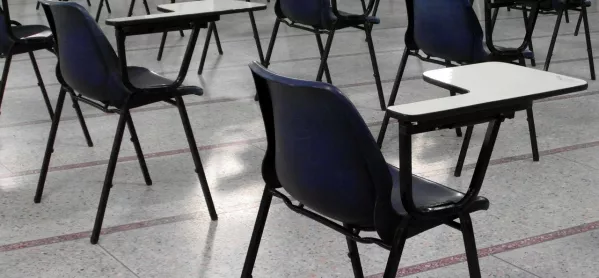- Home
- GCSEs: Guide to test that may decide crucial grades
GCSEs: Guide to test that may decide crucial grades

This year may turn out to be the first time a new test has been used to decide changes in the GCSE pass rates in maths and English.
The national reference test, first introduced by Ofqual in 2017, is designed to assess whether there have been genuine improvements in pupil performance, which would justify changes to the GCSE pass rate.
The test, which is taken in February and March by a random sample of 60 Year 11 pupils in 350 schools - just under 20,000 pupils in total - provides additional information on the awarding of GCSEs, as it indicates the percentage of pupils predicted to gain a grade 4, 5 or 7 in their exams.
Related: Using new test to change GCSE pass rate “irresponsible”
Need to know: The GCSE national reference test
News: Maths scores up in GCSE national reference test
The National Foundation for Educational Research, which runs the test under contract from Ofqual, assigns a random sample of 30 pupils in each school to sit the English test, and another 30 to sit the maths test, so that no pupil takes both assessments.
The content of both tests assesses similar skills to those found in GCSE content. For the maths test, Ofqual’s guidance states that “most of the questions are based on the GCSE content that all students taking the qualification have to study,” with a few questions at the end of the paper based on content from the higher tier.
In English, the test includes questions that require longer written responses as well as others that simply need short, one-sentence answers.
The questions also remain consistent year on year. Ofqual has tried to “keep the test questions as consistent as possible, reusing these each year”. While it does not routinely replace questions each year, it wants to retain the possibility of changing questions for a range of reasons, such as a security breach, replacing poorly performing questions, extending the range of curriculum coverage or adjusting to shifts in curriculum content.
If the percentages of a particular grade increase, the test results could be used to adjust the GCSE pass rate at a national level, effectively ending a relative freeze on increases in exam grades since the introduction of comparable outcomes in 2011.
However, the national reference test was not used to alter pass rates last year, although results showed a small increase in maths in 2018. There was no change in results for English language.
Ofqual still considered the test to be too new last year. The regulator also said that an initial rise in test scores in the first two years was “not surprising” as it expected performance to improve as teachers and pupils became more familiar with the revised content of the new GCSEs.
In the future, the test may also be used to adjust pass rates in other subjects, although if it is used to alter grade boundaries this year, it will only be used to change English and maths grades.
This year, Ofqual said it would decide whether to use the test to adjust results in May. This week, the watchdog confirmed it had used the test as part of a range of evidence this year.
But it will not reveal whether the results actually increased grade boundaries until tomorrow after GCSE results are published.
However, in a blog from Ofqual published in May, the regulator said it would be “cautious in deciding whether to adjust grade standards, especially where we believe there is still evidence of a sawtooth effect”.
This effect relates to a pattern where results from a new test or qualification increase in its early years due to increased familiarity with exam requirements. They said that any adjustments they make are likely to be relatively small to ensure cohorts from previous years are not put at a disadvantage.
Some experts have raised concerns over the reliability of the tests’ results. Alan Smithers, of the Centre for Education and Employment Research, said Ofqual would be “irresponsible” to use the test results this year, as results would improve through schools’ growing familiarity with the process.
A spokesperson for Ofqual said they have taken the sawtooth effect into account and “will not speculate on the potential use of test data in English and maths GCSE grading ahead of results coming out later this month”.
Register with Tes and you can read two free articles every month plus you'll have access to our range of award-winning newsletters.
Keep reading with our special offer!
You’ve reached your limit of free articles this month.
- Unlimited access to all Tes magazine content
- Save your favourite articles and gift them to your colleagues
- Exclusive subscriber-only stories
- Over 200,000 archived articles
- Unlimited access to all Tes magazine content
- Save your favourite articles and gift them to your colleagues
- Exclusive subscriber-only stories
- Over 200,000 archived articles



